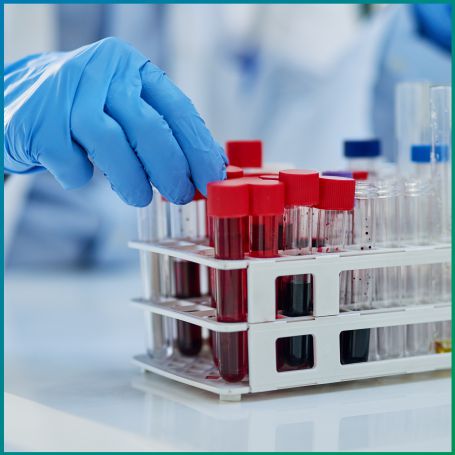
Angiotensin-converting enzyme (ACE) is an enzyme primarily found in the lungs, but also in smaller amounts in the kidneys, liver, and intestines.


The Angiotensin Converting Enzyme (ACE) by Spectrophotometry Test is a diagnostic tool used to measure the activity of ACE, an enzyme that plays a key role in regulating blood pressure and fluid balance in the body. This test is typically performed using spectrophotometry, a technique that allows the quantification of substances based on how much light they absorb at specific wavelengths. The ACE test is crucial for diagnosing a variety of conditions related to cardiovascular and kidney health, as well as monitoring certain genetic disorders.
1] Sample Collection: A blood sample is collected from the patient using a standard venipuncture procedure. The blood is then processed to obtain serum or plasma for analysis.
2] Enzyme Reaction: The blood sample is mixed with a substrate that ACE acts upon. Typically, the substrate used in the test is a compound called hippuryl-histidyl-leucine (HHL), which ACE cleaves to produce a colorless product.
3] Spectrophotometric Measurement: The reaction is allowed to occur for a set period, and the resulting changes in absorbance are measured using a spectrophotometer. The spectrophotometer detects how much light is absorbed at a specific wavelength, typically around 240 nm. The degree of absorbance correlates to the activity of ACE in the sample.
4] Calculation and Interpretation: The rate of change in absorbance over time is used to calculate ACE activity, which is usually reported in units per liter (U/L). Elevated or decreased ACE levels can indicate specific health conditions, which are further investigated through clinical evaluation and additional tests.
1] Sarcoidosis: One of the most common uses of the ACE test is to assist in diagnosing sarcoidosis, a condition characterized by the formation of granulomas (small clusters of inflammatory cells) in organs like the lungs, liver, and lymph nodes. Elevated ACE levels are often found in people with active sarcoidosis, though elevated ACE can also be observed in other inflammatory and granulomatous diseases.
2] Chronic Kidney Disease (CKD): ACE activity is often elevated in patients with chronic kidney disease. ACE inhibitors, a class of medications that block ACE activity, are commonly used to manage hypertension and diabetic nephropathy, making the ACE test useful in monitoring the efficacy of treatment.
3] Monitoring Treatment of Cardiovascular Conditions: Since ACE plays a role in regulating blood pressure and fluid balance, measuring ACE activity can help assess how well treatments for cardiovascular diseases, like hypertension or heart failure, are working.
4] Determining the Role of ACE in Genetic Disorders: ACE levels can be measured to assess certain genetic conditions, such as ACE gene insertion/deletion polymorphisms, which may be associated with cardiovascular and renal diseases. These variations in the ACE gene can affect enzyme activity and are sometimes evaluated for disease risk.
5] Evaluating Pulmonary Hypertension: ACE levels may be elevated in patients with pulmonary hypertension, a condition where the blood pressure in the lungs' arteries is higher than normal. By measuring ACE levels, doctors can gain insights into the pathophysiology of this condition.
6] Assessing Liver Diseases: Since ACE is found in the liver, it can be used as a marker in evaluating certain liver conditions, although it is not as commonly used as other liver enzyme tests.
At Diagnopein, we offer comprehensive, accurate, and timely diagnostic services, including the Angiotensin Converting Enzyme (ACE) by Spectrophotometry Test Pune. With our NABL-accredited labs, cutting-edge technology, and skilled technicians, you can be assured of reliable results every time. Get your results quickly, especially when time is crucial in detecting severe infections.
Competitive pricing without compromising on quality. Our team of experienced professionals ensures the test is conducted smoothly with minimal discomfort. We provide not just the Angiotensin Converting Enzyme (ACE) by Spectrophotometry Test results but insights into your health condition, helping you and your doctor make informed decisions about treatment. For more information call us at +91 9204 108108.
The test is typically used to diagnose and monitor conditions such as sarcoidosis, chronic kidney disease, pulmonary hypertension, and other cardiovascular or inflammatory disorders. It is also used to assess the effectiveness of ACE inhibitors in treating hypertension or heart failure.
A blood sample is collected, usually from a vein in the arm. The serum or plasma is then treated with a substrate that ACE acts upon. The resulting changes in absorbance are measured by a spectrophotometer to determine the enzyme’s activity level.
The ACE test involves a simple blood draw, so the typical risks associated with blood collection apply, such as mild discomfort, bruising, or infection at the needle site. There are no specific risks related to the spectrophotometry procedure itself.
ACE activity is reported in units per liter (U/L). Elevated or decreased ACE levels are compared against established reference ranges. High levels may indicate active sarcoidosis or other inflammatory conditions, while low levels could suggest an ACE deficiency or hormonal imbalances.